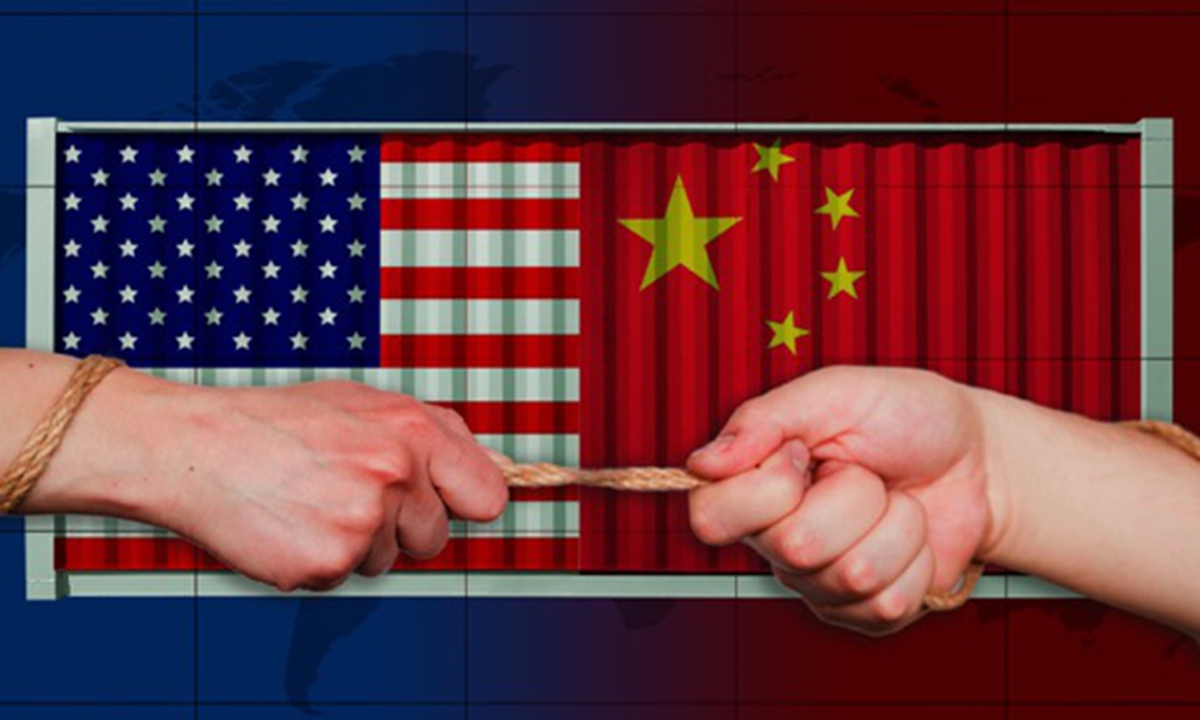Taiwan question a matter for both sides of Straits: Missouri State University professor
Source: Global Times Published: 2020/11/1 20:27:16

Photo: GT
Editor's Note:
The US has repeatedly played its cards on the Taiwan question. This has significantly irritated the Chinese mainland. Will Washington shift its Taiwan policy from strategic ambiguity into strategic clarity? Will military clashes break out between China and the US because of the Taiwan question? In a written interview with Global Times (GT) reporter Lu Yuanzhi, Dennis V. Hickey (Hickey), a foreign policy analyst and professor emeritus at Missouri State University, shared his views on these issues. Professor Hickey is the author of numerous books and articles focusing on the Chinese mainland and Taiwan.
GT: The upcoming US election seems to highlight the division of US society more than previous ones. The number of violent activities brought about by the election is also increasing. What's your take on US elections? Democracy is supposed to contribute to reaching a consensus, but at present, social division seems to be hard to be fixed. What do you think of such a phenomenon?
Hickey: Throughout our history, the US has experienced periods of social unrest and polarization. In the early 20th century, for example, anarchists bombed public facilities and assassinated former president William McKinley. Labor unrest was a major challenge in the 1920s because industrialists refused to grant workers higher wages and safer working conditions.
During the 1950s and 1960s, people struggled for civil rights and an end to America's involvement in the Vietnam War. Today, we see demands for an end to police brutality against people of color - a long-standing problem. It would be an exaggeration to attribute the recent violence to our elections. Democrats and Republicans are not battling each other in the streets. The two parties might call each other names, but they don't fight battles in the streets like Germany's Nazis and Communists did in the 1920s. The only "battles" in our streets are between small groups of protesters. Or between police and looters. And please note that most protests are peaceful.
GT: Since US President Donald Trump took office in 2016, partisan battles have become fiercer. Political polarization is deepening in the US. What are the reasons for political polarization in the US? How can Washington get out of political polarization?
Hickey: Most political analysts agree that President Trump has often embraced a confrontational approach toward politics - both domestic and international. Although this is not the only reason for political polarization within the US, it likely has contributed to it. There is also a disturbing tendency for those on opposite ends of a political issue here to demonize the opposition and avoid working toward common ground. Some suspect that social media platforms like Facebook contribute to the problem. In fact, a recent Pew Research poll found that 64 percent of Americans believe social media has a negative effect on our society. The cable news networks like CNN and FOX may also play a role. They are biased and tend to distort the news (both domestic and international) in an effort to provoke viewers and boost ratings. I don't see this changing any time soon.

Dennis V. Hickey Photo: Courtesy of Hickey
GT: You have said in an article that the "Taiwan question" stands out among all factors holding the potential to undermine US-China relations. Washington has recently made a series of aggressive moves and rhetoric on the Taiwan question from the perspective of Beijing. How do you think of the US repeatedly playing the Taiwan card? How will it affect China-US relations?
Hickey: As President Xi Jinping explained to President Trump in 2017, the Taiwan question "is the most important, most sensitive core issue in China-US relations, and concerns the political basis of the China-US relationship." Taiwan has always been the most important issue in Sino-American relations - a point made clear to Henry Kissinger when the two sides first met in Beijing in 1972.
President Trump understands the salience of the Taiwan question. And he made clear to John Bolton, then national security adviser, that he grasps the relative importance of the Chinese mainland compared to Taiwan. But some still seek to use Taiwan as a "chip" in "games" with Beijing. This is a dangerous game.
The US should abide by the three China-US Joint Communiques and the Taiwan Relations Act - the documents that guide American policy toward Taiwan. The president should veto any additional legislation - albeit largely symbolic - to upgrade ties with Taiwan. And calls by the lunatic fringe to establish military bases in Taiwan and/or other provocative proposals should be ignored.
Rather than make matters worse, Washington should play a positive role and call on Taiwan and the mainland to set aside their differences and talk to each other without preconditions. This will require compromise in both. According to long-standing US policy, the Taiwan question is a matter for both sides of the Taiwan Straits to settle by themselves and to settle peacefully. Washington should not play any role in discussions, but it ought to support the idea.
GT: Do you think the US' policy on Taiwan will turn from strategic ambiguity into strategic clarity?
Hickey: No, I do not think this will happen. The present US policy has worked well and helped promote peace and stability for decades. And it likely caused troublemakers on both sides of the Taiwan Straits to exercise a degree of caution.
GT: Do you think the US will break China's bottom line on the Taiwan question? Do you think military clashes will break out between China and the US because of the Taiwan question?
Hickey: No, I do not. The relationship between the US and China is arguably the most important one in the world. The two sides need to cooperate if the global community ever hopes to address a wide range of pressing problems. These include challenges to economic growth and stability, the scourge of international terrorism, the proliferation of weapons of mass destruction, global environmental degradation, threats to global health, and dwindling energy supplies, to name just a few. To be sure, we will continue to have sharp differences over some of these matters - particularly trade and investment. But these quarrels should be managed in a mature way. As for Taiwan, the US will continue to observe the "one-China policy" and the "one-China principle." And I also believe that the mainland is not going to launch a sneak attack on Taiwan.
RELATED ARTICLES:
Posted in: VIEWPOINT